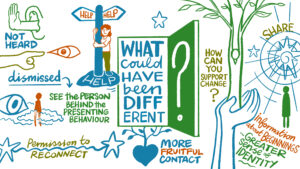The Other Side of Adoption: Birth parents experience of care proceedings and contact
If you’re exploring adoption in the UK — whether you’re considering domestic adoption, early permanence, or simply learning about the assessment and approval process — you’ve likely come across the term ‘contact’. And you might be wondering:
- What does contact mean in adoption?
- Is open adoption better than closed adoption?
- What is letterbox contact, and how does it work?
These are important questions, and The Other Side of Adoption – Birth parents experience of care proceedings and contact is a short film created by Adopt London — offers a powerful way to begin understanding the important function of contact in adoption.
The film shares the voices of birth parents who have lost their children through adoption and their stories which offer a rare and honest insight into what care proceedings, and what contact has meant to them, and why it matters for adopted children.
We spoke to Grace Panayiotou, Adopt London’s Early Permanence Project Manager, who worked closely with the birth parents featured in the film who share their stories with courage and honesty. Grace shares with us how the project came to life — why it matters, and how she hopes the film will inspire change for future families affected by adoption.
“The idea for this film came from a simple but powerful place: listening. Over the years, I’ve heard so many stories — from birth parents, adopters, social workers, and adopted people — and one theme kept coming up again: contact and how birth parents feel during care proceedings. How complicated it can feel, how emotional it can be, and how misunderstood it often is. I realised we needed something that could bring those voices together, something that could help people see and hear the person not just as a task or a policy, but as a deeply human experience.
I wanted this film to open up space for empathy and understanding. For birth parents to feel seen. For adopters to feel supported. For professionals to reflect. And most of all, for children and young people to benefit from the kind of thoughtful, meaningful contact that helps them grow up with a stronger sense of identity and belonging.”
At Adopt London we hope to use the film in lots of different ways —in training sessions, in conversations with potential adoptive families, and as a tool for growth, change and reflection in social work teams. It’s not about telling people what to do, it’s about starting honest conversations and helping everyone involved in adoption to think more deeply about what contact really means, and why good contact matters.
Some of the key messages that came out of making this film are simple but powerful:
- Contact is not about ticking a box — it’s about building relationships.
- Birth parents are not the past — they are an important part of a child’s life story.
- Adopters need support, not pressure, to make contact work.
- And children, they deserve opportunities for truth, connection, and continuity.

Grace summarised:
“Looking ahead, I’d love to see social work practice shift towards more openness, curiosity, and compassion. That means: 1. giving birth parents more support, not just at the point of adoption, but long after. 2. It means preparing adopters better, not just for parenting, but for navigating lifelong relationships. 3. And it means making space for children’s voices to be heard, listened to and recorded even when they’re too young to speak to them yet.
My hope is that this film helps families feel less alone in the adoption journey. That it softens some of the fear and replaces it with understanding. That it encourages professionals to think differently. And that, in some small way, it helps build a culture where contact is seen not as a burden, but as a bridge – one that connects children to their roots, their stories, and the people who love them.”
We invite you to watch The Other Side of Adoption – Birth parents experience of care proceedings and contact.
